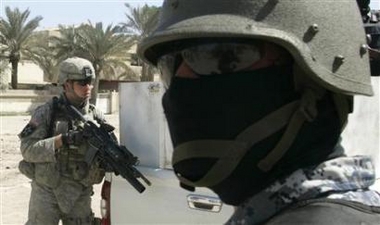US military plans Iraq fallback strategy
(Reuters)Updated: 2007-03-12 18:26
WASHINGTON - US military planners have begun work on a fallback strategy in case the US troop buildup in Iraq fails, including a gradual pullout of US forces and more emphasis on training and advising Iraqi forces, the Los Angeles Times reported in Monday's editions.
 A US soldier (L) from Delta company 2/325, 82nd Airborne and an Iraqi national police officer conduct a joint patrol in Baghdad's Sadr City March 11, 2007. [Reuters]  |
It is a fallback if the Bush administration's plan to send about 26,000 more US troops fails to stabilize Iraq, or if the Democratic-led Congress limits that move, it said.
The newspaper quoted a Pentagon official as saying "This part of the world has an allergy against foreign presence. You have a window of opportunity that is relatively short. Your ability to influence this with a large US force eventually gets to a point that is self-defeating."
The United States sent 55 Green Berets to El Salvador to help its military fight rebels from 1981 to 1992, in a drive to make the US military presence less visible, the newspaper said.
It said Pentagon officials said the Iraq plan would have to entail many more advisors, but that the El Salvador model had influenced planning.
There are currently about 140,000 US troops in Iraq.
Shifting from a troop increase to more reliance on an advisory role would bring the administration more in line with the Iraq Study Group, the bipartisan panel that recommended a gradual reduction in US combat forces in Iraq.
|
||
|
||
|
|